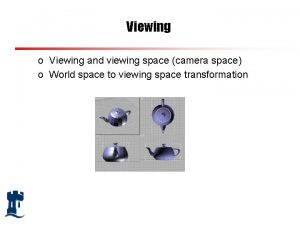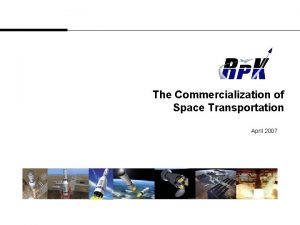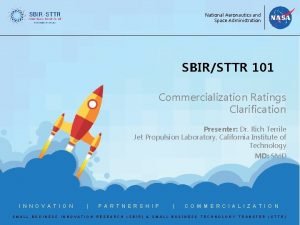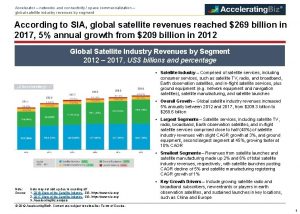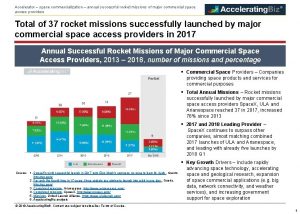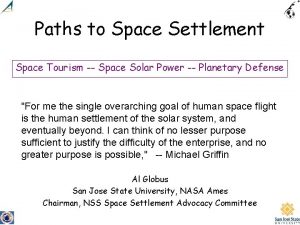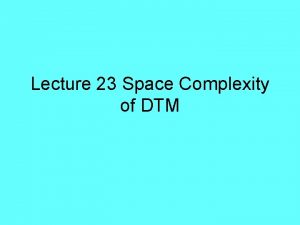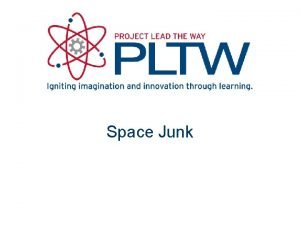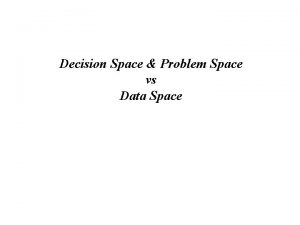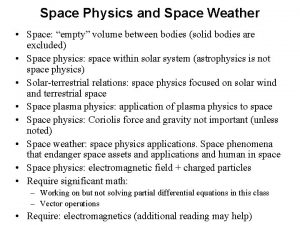Commercialization of Space 2 April 2019 Commercialization Use























- Slides: 23

Commercialization of Space 2 April 2019

Commercialization • Use of equipment sent into or through outer space to provide goods and services of commercial value • Example: Telstar 1 (1962) demonstrated TV transmission • Example: Syncom 3 (1964) broadcast Olympics from Japan

History • NASA has always spent most of its funding on private companies: • Aerospace corporations, launch service providers, subcontractors, universities • Department of Defense similarly • It has also fostered commercial activities in space: • Communications, microgravity uses, manufacturing


Initial NASA Approach • Specifications and control by NASA • Providers are sub-contractors, must meet NASA specs • Profits and incentives determined by NASA • Complaints: High cost, low efficiency, little innovation


Outer Space Treaty (1967) • Does not allow national claims of territory • Requires governments to supervise their citizen’s activities • Vague on liabilities, definitions, procedures • Did not envision all possible activities • Can companies sell resources mined in space? • Do possible commercial activities violate the treaty?

Commercial Space Ventures • Communications: highly profitable, supports direct broadcasting • Satellite navigation • Natural resources and remote sensing: never supported itself, until Google used free images • Launch vehicles now a big market • Transport to ISS to replace Shuttle, Russians • Tourism: expensive but popular • Mining: technically and economically feasible?


New Paradigm for Commercialization • NASA will purchase complete services for a fixed fee • Contractor decides how to meet specifications • Competition drives innovation and reduces price • NASA concentrates more on deep space and exploration

Selection of Boeing and Space. X (2014) • Selection of Boeing and Space. X as the providers of a U. S. -based capability to take humans to the International Space Station (ISS) is a major milestone in the almost sixdecade history of space exploration. It is just the latest sign that the old paradigm of government-only space travel is being replaced by something else -- a new business ecosystem composed of novel relationships among NASA and the aerospace industry

• No longer will NASA own the ISS "trucking company" -- specifying every nut and bolt. Instead, NASA is buying services from U. S. industry. To be sure, the new announcement made it clear that NASA will be carefully examining the safety aspects of each design. But the designs will still be those of Boeing and Space. X and vetted by NASA.

• “The rest of the world is still stuck in a nearly government-only mode, NASA, with the support of the Obama administration, is letting loose the creativity of American knowhow” (G. Scott Hubbard, Stanford University) • The Trump administration is even more positive

At the Oct 5 2017 meeting of the new National Space Council, Vice President Pence called for a full review of the U. S. regulatory framework for commercial space enterprise.

Commercial outer space can promote economic growth, innovation, and stronger national security. However, achieving these goals will require several changes in space policy: • The Office of Commercial Space Transportation (FAA AST) should be elevated to a separate bureau under the Department of Transportation; • Responsibility for situational awareness of non-national-security-related space assets should be placed in a non-profit, non-governmental, multi-stakeholder organization; • When the government requires space capabilities, it should buy privatelyprovided services and encourage competition in launch and non-launch markets; and • Government agencies with regulatory or oversight authority over the commercial space industry should default to approval for new missions. Agency procedures for overruling default approval should be transparent and should include a process of appeal. • The United States is on the cusp of having an independent commercial space market. With a few smart decisions and a policy of regulatory restraint, the government can simultaneously promote innovation, growth, and national security, while proving that enterprise in space does not require the backing of a large nation state. That would be a giant leap for mankind

More from Scott Hubbard • NASA's proper role can be summed up in three words: "Explore Deep Space. " It is time for NASA to turn over the low Earth orbit work to industry while NASA focuses on getting humanity to Mars, following in the tracks of robotic rovers Spirit, Opportunity and Curiosity. History teaches us that without a trailing edge of commercial exploitation and profitability, exploration as large scale, routine human endeavor will not succeed.

Reasons for Government Support • Financial market insufficient – High uncertainty and/or risk – Large fixed costs – Long lead times for payback • Examples: Nuclear power, airmail


Results of recent launch failures • Examples: OSC Antares, Space. X Falcon 9 • Show some risks and also recovery strategies • Space. X has now recovered with Falcon Heavy success

The Future of Space Commercialization Joshua Hampson Security Studies Fellow The Niskanen Center January 25, 2017 Executive Summary This paper argues for the importance of commercial uses of outer space to the economy and national security of the United States. It lays out a short history of developments in commercial outer space, enumerates the challenges facing this emerging market, and offers suggestions for policies to address these challenges. It’s not possible to provide comprehensive answers to all of the problems the United States may encounter in outer space, but the suggestions provided offer a starting point for creating a healthy, safe, and robust commercial space environment. .

• Beginning with the NASA Commercial Orbital Transportation Services competition, continuing with the Commercial Resupply Services (cargo) and now the Commercial Crew selection, NASA "bet the farm" on commercial companies filling the gap left by the retirement of the space shuttle, with the Commercial Crew companies (Space. X and Boeing) replacing the Russians in bringing NASA astronauts to the ISS. This will allow NASA to invest the savings in deep space capabilities such as SLS and Orion.

Summary • Many uncertainties: Technical and economic feasibility still not demonstrated • US has good record of fostering commerce • New paradigm may allow more focus on exploration • Space. X is changing the paradigm • Government is still the principal market for space activity • Do profits allow a new, different future?

Summary • As the government switches to riskier and more difficult deep space missions, the speculation is that it will increasingly turn more established functions like lower Earth orbit -- where ISS orbits -- over to private enterprise. • NASA awarded contracts to Space. X and Boeing to transport crews to and from the ISS. • Space. X has bold plans to explore Mars • As with any fledgling industry, it's going to take a lot of innovation and a lot of work to foster an autonomous commercial space market. But once that market is fully developed, the possibilities will be out of this world.
 Disadvantages of commercialization of sports
Disadvantages of commercialization of sports Technology commercialization process model
Technology commercialization process model Green revolution ap human geography
Green revolution ap human geography Pcb alignment pin
Pcb alignment pin Joint space vs cartesian space
Joint space vs cartesian space Space junk the space age began
Space junk the space age began Camera space to world space
Camera space to world space Cartesian space vs joint space
Cartesian space vs joint space World space computer
World space computer Yesterday
Yesterday Shakespeare born and died
Shakespeare born and died April 23 1616
April 23 1616 30 days has september april june and november
30 days has september april june and november April school activities
April school activities 26 april 1564
26 april 1564 April savoy allstate
April savoy allstate 8 day week
8 day week Vårmåneder
Vårmåneder April rustianto
April rustianto Leonardo da vinci was born on april 15 1452 in vinci italy
Leonardo da vinci was born on april 15 1452 in vinci italy Leonardo da vinci was born on 15 april 1452 near
Leonardo da vinci was born on 15 april 1452 near Berikut ini merupakan definisi pajak kecuali
Berikut ini merupakan definisi pajak kecuali Calendar april 2009
Calendar april 2009 Guten morgen freitag 1 april
Guten morgen freitag 1 april






